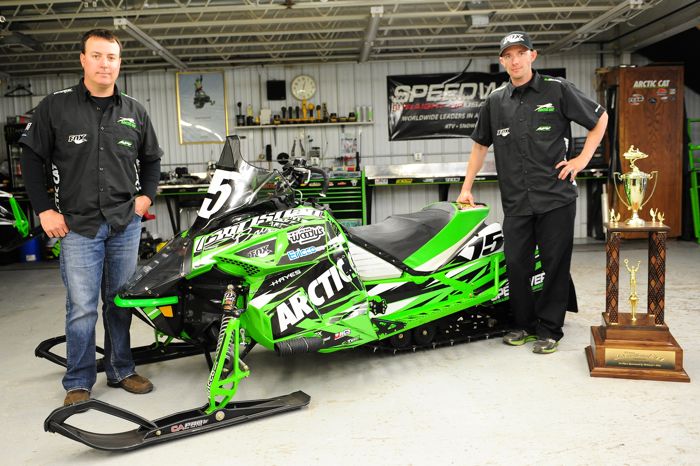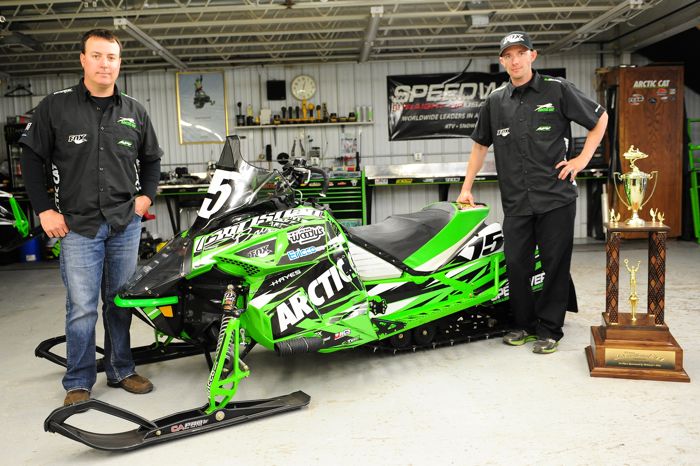
This past season, a huge effort by a cadre of Arctic Cat racers, engineers, speed shops, mechanics and crew members crafted three identical race sleds to contest the famed Soo 500 International enduro in Sault Ste. Marie, Mich. The effort began in the Team Arctic Race Shop in Thief River Falls as well as Speedwerx in Forest Lake, Minn.
The ideas and engineering built into these three machines reflected the knowledge and expertise of racers and crew who had competed in multiple Soo 500 events. The ideas were tested in the Pro Open class during early season cross-country lake races, on a replica Soo test track (compliments of Christian Brothers Racing) and then honed during the five intense days of practice, qualifying and racing that comprise Soo’s version of Speed Week.
The effort culminated with Team Arctic going 1-2-8 with the three sleds, marking just the second time in Soo history that an Arctic Cat had won (the first occurring in 2010 with Cadarette Racing, who claimed second this past season).
This is the winning machine that was piloted that day by Team Arctic’s Brian Dick and Wes Selby, the photos taken at the Team Arctic Race Shop in June.
The sled (and its two identical siblings) began as a stock Arctic Cat ZR6000R SX race sled, but it didn’t remain stock for very long.
The mile-long oval at the Soo presents a huge challenge to teams contesting the arduous event. It starts as a smooth ice oval that rewards its fastest laps and top qualifying times to pure oval sleds with just a couple inches of suspension travel. But after a couple days of qualifying, followed by the Woody’s Challenge pre-race, and then the first 50 or so laps of the actual Soo 500, the once smooth ice track slowly transforms into holed-out, bump strewn course that’s more cross-country than it is a typical ice-oval.
It’s during this transformation that the purpose-built Champ sleds that set the fastest qualifying times either fade or pull off, content with their 15 minutes of fame, while sleds with more suspension travel take over the race towards the ultimate prize.
To win the Soo, you need a sled that can run well when the track is smooth; go fast around the long sweeping turns; AND handle the bumps (which can get get upwards of 2-feet tall) once they develop. It’s a huge challenge, and the Arctic Cat crew responded by building sleds meant to go fast around the corners and through the bumps.
Up front, the sled’s ski stance was widened to the maximum allowed width of 45 inches (center-to-center) via lengthened A-Arms. Coil-over FOX 1.5 ZERO RC2 Podium shocks did the dampening duties up front, utilizing the stock springs. They opted for the heaviest swaybar option, with custom adjustable linkages.
The crew chose C&A Pro skis for their ability to corner once the track was covered in loose ice/snow produced by the churning of carbides and studs. To ease changing skis (and, with them, the carbides) during pit stops, the ski saddles were modified so that the rubber mounting blocks were permanently affixed, along with nuts that were welded to plates (that were then riveted to the saddles) for the spindle bolts. The result was ultra-quick, hassle-free ski/carbide changes during pit stops.
“We could change both skis in about 20-seconds,” said Mike Kloety.
For the rear, the group built a modified version of the skidframe used current ZR6000R XC race sled. It had the same length front arm, but with revised geometry for additional coupling and transfer control. The shocks and springs were developed based on previous Soo efforts. A Larson Racing fourth wheel kit was added to the rear axle, along with additional wheels to contend with the dry ice conditions of the Soo track. Custom mounting plates were added to the tunnel to accept the hybrid rear suspension.
A 14-in. wide Camoplast Ripsaw track with 1-in. lugs was chosen for the task, principally for its speed advantage compared to a standard 15-in. wide track.
With the suspension and shocks set for about 5 inches of travel, the Soo sleds handled the rough track superbly.
“We started the race with more suspension travel than others,” says Selby, “But our sled handled the bumps and evolving conditions exactly like Brian [Dick] predicted it would. There was no swapping, no hard hits, just nice control. We weren’t much slower than the Champ sleds on the smooth ice, as we stayed around second or third place for the first 30-40 laps. Once it got rough, we were dialed-in.”
One trick was added to the sled after the team had arrived at the Soo: the clear plastic shield that extends above the front nose/airbox.
“We saw that Cadarette had a guard like this to prevent snow and dirt from piercing or entering the intake screens,” said Selby. “It’s a smart idea, so we built a couple for the other two sleds.”
The Hayes brake system saw a few modifications. A custom stainless steel disc replaced the stock disc, offering slightly longer disc life. To further extend brake performance, a custom vent tube directs outside air to the caliper and disc. They retained the more durable alloy SX master cylinder and the stock caliper.
Like most purpose built Soo sleds, this one saw modifications for driver ease and comfort:
A Wahl Bros. handlebar provided a tried and true position while turning left. They also added a foot kick plate to position their right feet in order to help body position coming into, and getting through, the corners.
The seat was modified for a lower front half, easing hanging off on the left side during corners as well as lowering the center-of-gravity while doing so. A medium-height Arctic Cat accessory windshield offered excellent wind protection, and was modified to allow clearance for the left side hand guard.
Where is that hand guard, since the mounting bracket is still on the bars?
It was a casualty of the one mishap during the race: Brian Dick’s crash in turn one that occurred around lap 215. Upon remounting, Brian tore off the flapping guard and tossed it to a track worker.
An effort to purge unnecessary weight saw the removal of unneeded plastic pieces around the hood as well as the drilling-out of various items.
For safety, a required rear tunnel enclosure was added. Likewise, an LED tail/brake light was added and repositioned to the seat (rather than the rear of the tunnel). It was bolstered by always-on (battery-powered) taillight that is required by Soo rules.
While the chassis and suspensions were built in the Race Shop, three 2015 Arctic Cat C-TEC2 600 engines were at Speedwerx, receiving a full suite of modifications that offered the acceleration and speed required to contest the Soo.
Those mod’s included ported cylinders; Speedwerx custom ceramic-coated, race-spec twin pipes (with anti-vibration pipe banding); Speedwerx stock cylinder head mod with interchangeable high compression inserts; bored throttle bodies; bottom-end mods for removal of the thermostat; and ECU remapping for fuel and ignition timing.
According to Jeremy Houle from Speedwerx, the modified engine produced horsepower in the 150-range, running 8700-8800 RPM via TEAM drive and driven clutches (sporting Speedwerx-machined weights). The petroleum spec: 114-octane VP C14 fuel and C-TEC2 synthetic oil.
“We chose the C-TEC2 600 because EFI offers key benefits during a race where the temperatures can fluctuate 20 degrees,” said Brian Dick. “We knew Speedwerx could get the kind of power needed from the engine, which they proved with the early versions that we raced and won with in USXC earlier in the season.”
The crew at Arctic Cat modified the fuel tank to accept the required fuel pump for the EFI system. In addition, they added a massive vent line to the tank that exited on the right side running board.
“The quick-fill fuel system requires a lot of venting,” says Selby. “Our system provided it. We gave it an on/off valve by the exit, which Brian and I could open as we came into the fuel stop, then close after fueling. It worked pretty slick.”
The group used a TEAM primary clutch along with the TEAM secondary unit.
How did the Soo sled compare to a stock ZR6000R XC race sled that Selby used in ice races last season?
“The Soo sled is a lot more powerful,” he says! “It feels lighter too, although I’m not sure if it’s actually lighter. It might be the added power that makes it feel light.
It’s an understatement to say that the special three-sled project was successful. Finishing first, second and eighth at the Soo was a huge accomplishment, reflecting on the sled, the racers and their dedicated crews.
The future of the 2015 Soo 500 is still a bit cloudy: Will it reside at the Race Shop, in Brian Dick’s garage, Selby’s garage or someplace else?
What IS known, is that the second Arctic Cat to win the Soo 500 enduro is a piece of history that will be preserved as it is, which is exactly how it left the track in Sault Ste. Marie last February.
Thanks for reading.
The above image is inside the Team Arctic Race Shop, taken at 9:30 p.m. on Wed., January 28, 2015. A large crew of racers, mechanics and people were helping to build the three custom Soo sleds, plus the Iron Dog machines used by Cory Davis and Ryan Simons.
The Soo sleds are in the foreground.
Wes Selby, applying a layer of silicone to seal off the various seams and holes on one of the three Soo project sleds.
Peering inside the Team Arctic Race Shop from outside the back door. There were a lot of late nights spent here fabricating and assembling the various project sleds for the 2015 season.
Brian Dick (left) and Wes Selby share a laugh during the photo shoot this summer.
